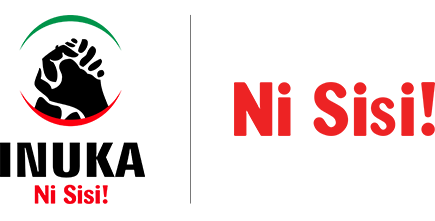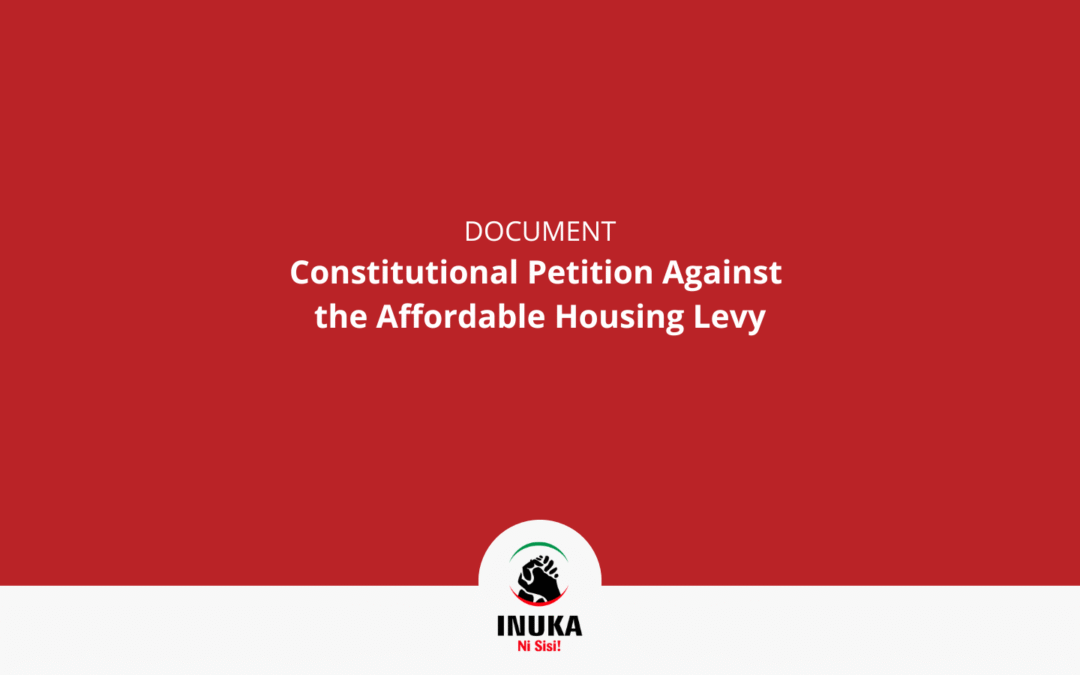

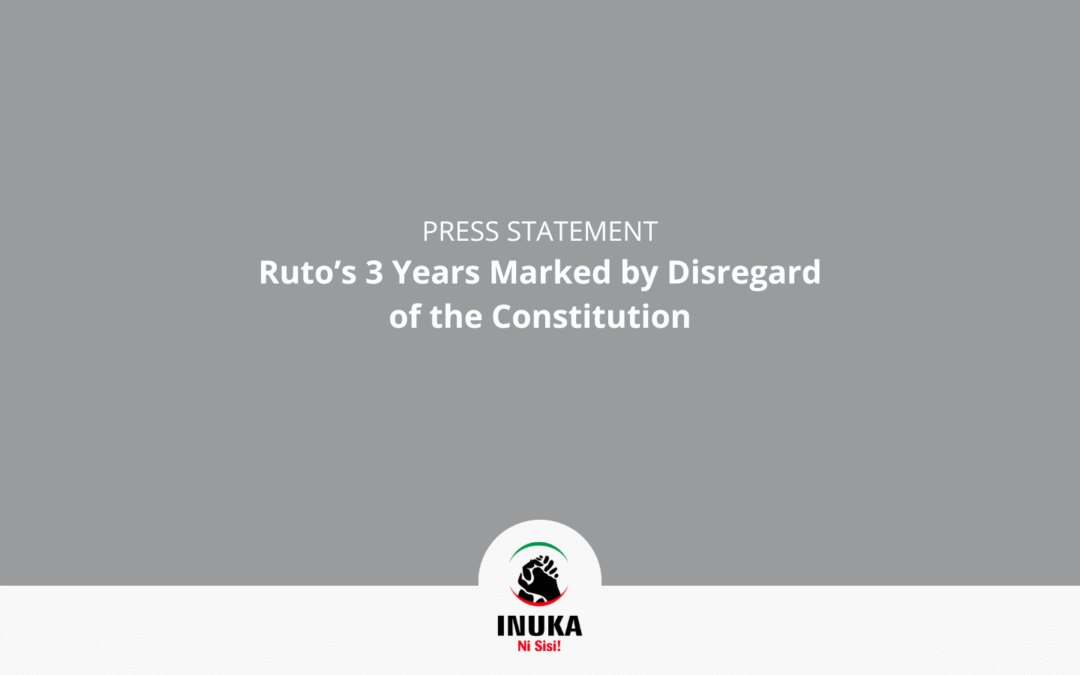
Ruto’s 3 Years Marked by Disregard of the Constitution
September 18, 2025 – Nakuru, Kenya
Three years into Kenya Kwanza’s regime, the country faces a constitutional and human rights crisis marked by state violence, corruption, and institutional capture. The promise of a people-centred “hustler” government has collapsed into authoritarian rule that undermines democracy and endangers citizens.
Despite initial gestures of reform, the regime has consistently defied court orders and created unconstitutional offices and bodies. The President branded judicial officers as “cartels” and openly declared that no courts of law would stand in his way. Courts halted the unconstitutional actions like the gazettement of seven IEBC commissioners, and demanded the disclosure of debt contracts, but the regime blatantly ignored these orders.
Parliament has been reduced to a clearing house of the State House, passing punitive laws such as the Affordable Housing Levy and regressive Finance Bills, despite public opposition.
Attempts to extend presidential terms and restrict freedom of assembly further entrench authoritarianism. The Office of the Director of Public Prosecutions has been converted into a political weapon. Corruption cases against William Ruto’s allies, including Henry Rotich, Wycliffe Oparanya, and Aisha Jumwa, have been dropped, while ordinary Kenyans have faced trumped-up charges for exercising their right to protest. At least 75 protesters face trumped-up terrorism charges and over 450 others, including minors, face serious criminal charges, which are false.
Since 2022, state security forces have unleashed deadly violence on citizens. At least 246 people have been killed by police under the Kenya Kwanza regime’s watch. However, we caution that the actual numbers are far higher, as the regime has deliberately concealed and tampered with evidence to mask the true scale of its abuses. In July 2023, 51 protesters were gunned down within five days during demonstrations against tax hikes, bringing the total fatalities caused by police force that year to 118.
In 2024, Gen Z-led protests left at least 63 people dead, 601 injured, 1,765 arbitrarily arrested, and 82 forcibly disappeared. By September 2025, 65 more deaths, 355 unlawful arrests, and three disappearances had already been documented. Human rights defenders and organizations continue to face reprisals designed to intimidate and curtail their agency, despite repeated commitments by the regime to uphold the rule of law and protect civic space for citizen participation in governance.
The Communications Authority of Kenya further aided censorship by disrupting live TV coverage of protests, while civil society and international donors were harassed for supporting the right to protest.
All these violations have made CIVICUS Monitor rate Kenya “repressed”, the second worst rating a country can receive, indicating severe restrictions to the freedoms of expression, peaceful assembly, and association.
The Kenya Kwanza regime has also ballooned public debt by Sh2.9 trillion — from Sh8.6 trillion in June 2022 to Sh11.8 trillion by June 2025. According to reports from the Controller of Budget, part of these funds has been squandered on lavish domestic and foreign travel. Without such wasteful borrowing, Kenya could comfortably finance education and health. Still, the development budget in all three years has consistently been less than 10 percent, despite the constitutional provisions for at least 30 percent.
Additionally, the regime has also been plagued by grand corruption scandals, including Sh6.6 billion, reportedly lost in edible oil imports, and Sh3.7 billion in irregular Malaria nets procurement at KEMSA, Sh3.5 billion through the fake fertilizer programme, and hundreds of millions lost through the National Youth Service and Kenya Pipeline Company. Consequently, Kenya’s global standing plummeted, with a Transparency International 2024 score of 32 out of 100, ranking 121st worldwide.
Despite this tragic situation, we are greatly encouraged by increased citizen vigilance, the valour of our young people in defence of the Constitution, and the successful court decisions. To restore constitutional order and safeguard Kenyans’ rights, members of the civil society organizations demand:
- Immediate respect for the Constitution, the rule of law, and obedience to court orders.
- Parliament asserts its independence and withdrawal of retrogressive bills, including the Assembly and Demonstration Bill (2024), which seeks to curtail freedom of expression, assembly, and protest, and the Constitution of Kenya (Amendment) Bill of 2024, which wants to extend the presidential term from five to seven years.
- An end to ODPP’s role as a political weapon, and reinstatement of dropped graft cases.
- There must be financial, political, and operational independence of constitutional bodies to protect rights and fundamental freedoms.
- Protection of civic space, including free media and the right to protest, as well as independent investigations into all cases of killings, disappearances, and torture since September 2022, with accountability for perpetrators.
- The Office of the Auditor-General should conduct special audits on all initiatives by the Kenya Kwanza regime, such as the Affordable Housing, Hustler Fund, and health funds under the SHA. There must also be audits of tenders issued under these initiatives and beneficial owners of companies contracted. Additionally, the EACC must initiate independent investigations into repeated claims of conflict of interest and theft of funds in corruption scandals exposed under this regime.
Signed
- ARTICLE 19 Eastern Africa
- Center for Enhancing Democracy and Good Governance (CEDGG)
- CRECO
- Defenders Coalition
- Haki Yetu
- Independent Medico-Legal Unit (IMLU)
- InformAction
- Initiative for Inclusive Empowerment (IIE)
- Inuka Kenya Ni Sisi!
- Kenya Human Rights Commission (KHRC)
- Kenya Muslims for Human Rights (MUHURI)
- Kituo cha Sheria
- Midrift Hurinet
- PEN
- The Institute for Social Accountability (TISA)
- Transparency International Kenya (TI Kenya)
- Tribeless Youth
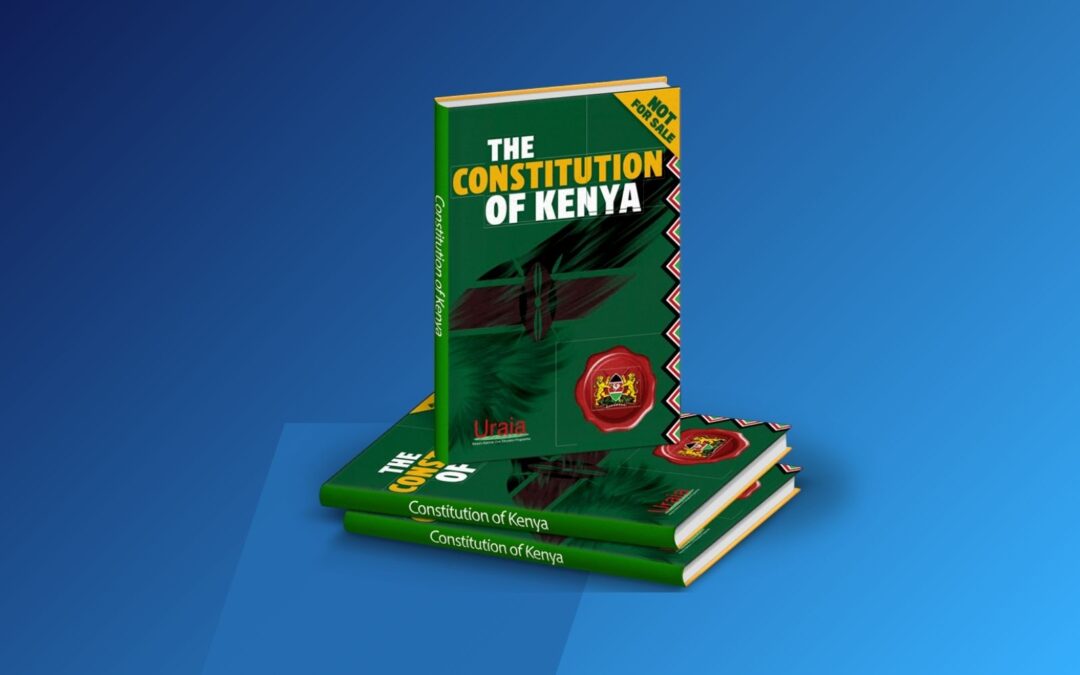
Katiba Day Belongs to the People, Not to Those Who Betray It
Fifteen years after its promulgation, the Constitution’s transformative promise remains largely unfulfilled. Though it envisioned a democratic, accountable, and people-centered state, critical provisions on governance and social justice have been ignored, undermined, or manipulated.
Peaceful protesters, particularly young Kenyans in the recent Gen Z-led demonstrations, have been met with bullets, abductions, and killings. This undermined the right to assemble and petition under Article 37.
The Executive has repeatedly disobeyed court orders, eroded the authority of the Judiciary, and weakened constitutional checks and balances. Independent commissions and oversight institutions, established under Chapter 15 to safeguard accountability, have been starved of resources, undermined, or brought under Executive thumb.
Devolution, one of the Constitution’s most significant gains, has been systematically weakened through delayed and inadequate funding of counties, crippling essential services such as healthcare and education.
Populist directives, such as the victims’ compensation framework, which bypasses lawful processes, and the multi-agency anti-corruption taskforce, which usurps the role of constitutional commissions, continue to prove the regime’s disregard for the rule of law. Meanwhile, corruption and the wastage of public resources remain rampant, robbing Kenyans of opportunities and deepening inequality.
At the same time, the regime has failed to realize the socio-economic rights guaranteed under Article 43. Millions of Kenyans face worsening unemployment, collapsing education standards, and a failing health system.
Against this backdrop, President William Ruto’s declaration of Katiba Day appears less about honoring the Constitution and more about sanitizing a record of consistent violations. For the last 14 years, citizens, civil society, and progressive actors have faithfully marked the anniversary of the Constitution’s promulgation, even under hostility from successive regimes. Katiba Day has always provided a moment for Kenyans to reflect, take stock, and reaffirm their commitment to defending the Constitution. They did not need a presidential proclamation to remember this day, as it has always belonged to the people.
This year’s theme, “Inuka Uilinde” or “arise and defend the Constitution”, is a timely reminder that the Constitution must be rescued from political expediency and defended by the people it was written for. The Gen Z movement has already shown the power of citizen action in exposing impunity. It must now be sustained and broadened. As civil society organizations, we demand the following actions in defense of the Constitution:
- There must be a fidelity to the letter and spirit of the Constitution. Populist, unconstitutional directives must be abandoned in favor of lawful processes anchored in the Constitution.
- Interference with Parliament and the Judiciary must end. Legislators should be free to exercise their oversight and lawmaking roles without Executive influence, while independent commissions and oversight bodies must be adequately resourced to fulfill their mandates free from political manipulation.
- There must be justice for victims of state violence, past and present. Corruption and wastage must be confronted decisively, and those responsible for human rights violations and the looting of public resources must be held accountable.
Signed:
Act Change Transform (Act!)
Article 19 East Africa
Civic Freedoms Forum (CFF)
CRECO
Defenders Coalition
Haki Yetu
Initiative for Inclusive Empowerment
International Justice Mission (IJM)
Independent Medico-Legal Unit (IMLU)
InformAction
Inuka Kenya Ni Sisi!
Katiba Institute
Kenya Human Rights Commission (KHRC)
Kenya Land Alliance (KLA)
Kituo cha Sheria
Mazingira Institute
Muslims for Human Rights (MUHURI)
Siasa Place
The Institute for Social Accountability (TISA)
Transparency International Kenya (TI Kenya)
Wangu Kanja
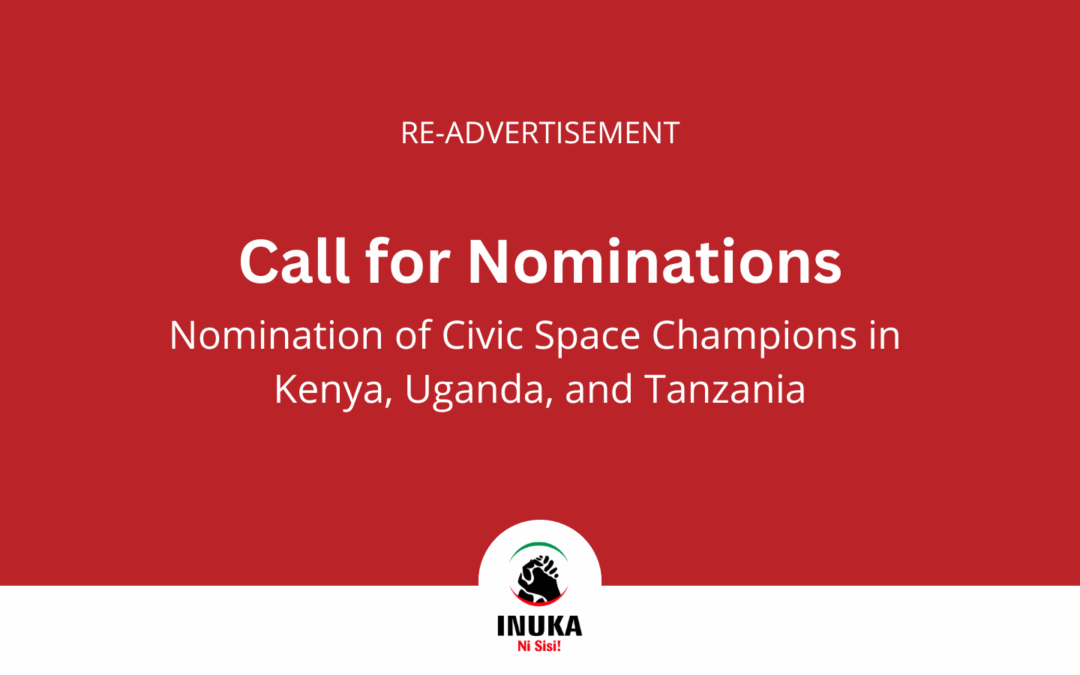
Nomination of Civic Space Champions in Kenya, Uganda, and Tanzania
Inuka Kenya conducted a study on Shrinking Civic Space between December 2023 and February 2024 in Kenya, Tanzania, and Uganda. The study was informed by the need to create a knowledge base for advocacy on civic space. Civil Society Organizations (CSOs) are at the forefront of these challenges, experiencing heightened risks such as forced disappearances, threats, violence, and in some cases, targeted killings—often believed to be carried out by government or ruling party operatives, or national security agencies.
The study recommended that civil society must strengthen knowledge-building and evidence-based advocacy, engage in continuous and targeted capacity assessment, and building in view of changing civic space dynamics. Also, civil society must build coalitions and networks nationally, regionally and internationally, diversify its resource bases and design and implement strategic national and regional responses to civic space infringements. It is critical also to invest in technology, strengthen security training and programming and increase community outreach and constituency building. CSOs must also develop a crisis-response plan, which includes cultivating support from among government officials as an early warning plan. It is on the basis of this that Inuka Kenya seeks to identify, support, and amplify champions—two (2) individuals per country who lead and inspire resilient civil society initiatives.
Inuka seeks to:
Identify individuals demonstrating strong leadership and commitment to civil society resilience in Kenya, Uganda and Tanzania.
Commitment to civil society resilience in this context refers to an individual’s sustained efforts to strengthen and protect civic spaces, grassroots movements, and democratic participation, even in the face of challenges such as government restrictions, funding shortages, or social opposition. It includes:
- Defending Civic Space & Rights – Advocating for freedoms and human rights, ensuring that civil society organizations (CSOs) operate without undue restrictions.
- Sustained Engagement in Advocacy & Governance – Actively participating in policy reforms, social justice movements, and human rights campaigns to enhance accountability and transparency.
- Capacity Building & Grassroots Mobilization – Strengthening local communities by providing knowledge, tools, and platforms for civic engagement and empowerment.
- Innovation & Adaptability – Developing new approaches to activism, governance, and community engagement, leveraging technology and creative strategies to overcome challenges.
- Collaboration & Solidarity – Building networks across different sectors (civil society, academia, private sector, and government) to amplify impact and sustain long-term change.
Champion Characteristics:
- Deep commitment to community engagement and societal change.
- Ability to mobilize resources and build collaborative networks.
- Proven track record of resilience in the face of challenges.
- Strong communication skills and capacity to influence public opinion.
- Alignment with the values and strategic goals of the civil society organization.
Competency Measures for Champion Characteristics
Commitment to Community Engagement & Societal Change
- Evidence of past participation in community projects, advocacy, or policy initiatives. • Number of initiatives led or contributed to that resulted in tangible social impact. • Testimonials or endorsements from community members and peers.
Resource Mobilization & Network Building
- Ability to secure funding, partnerships, or in-kind support for initiatives.
- Demonstrated history of collaboration with multiple stakeholders (e.g., NGOs, government, grassroots organizations).
- Size and diversity of the network engaged in past projects.
Resilience & Adaptability
- Ability to navigate setbacks and continue working toward objectives.
- Case studies or examples showcasing problem-solving in challenging situations. • Self-assessment or peer feedback on handling pressure and adversity.
Communication & Public Influence
- Public speaking engagements, media appearances, or published articles.
- Social media reach and engagement on advocacy-related content.
- Ability to articulate complex issues in a way that resonates with diverse audiences. Alignment with Civil Society Values & Strategic Goals
- Demonstrated commitment to human rights, social justice, and democratic values. • Consistency of past work with the organization’s mission and vision.
- Willingness to work within the ethical and operational frameworks of the civil society sector.
Identification Criteria
- Core Competencies:
- Commitment: Demonstrated passion and long-term involvement in civil society issues.
- Influence: Ability to inspire others, backed by a strong network of supporters.
- Innovation: Track record of creative solutions and adaptability to challenges.
- Communication: Proficiency in articulating ideas, both verbally and through digital channels.
- Integrity: High ethical standards and alignment with organizational values.
Competency Measures for Core Competencies
Commitment (Passion & Long-term Involvement in Civil Society Issues)
- Years of active participation in civil society initiatives, campaigns, or organizations. o Number of projects or advocacy efforts sustained over time.
- Testimonials from colleagues, beneficiaries, or partners confirming dedication.
- Evidence of continuous learning (e.g., training, certifications, thought leadership in relevant areas).
Influence (Ability to Inspire & Mobilize Others)
- Size and diversity of the network actively engaged in advocacy or social change efforts.
- Demonstrated history of mobilizing communities, volunteers, or stakeholders for a cause.
- Media presence, public speaking engagements, or published content influencing public discourse.
- Social media engagement metrics (e.g., reach, shares, meaningful interactions on advocacy content).
Innovation (Creative Problem-Solving & Adaptability)
- Case studies or examples of innovative solutions implemented in past projects. o Ability to pivot and adjust strategies in response to challenges or emerging issues. o Feedback from peers or supervisors on the effectiveness of problem-solving skills. o Recognition or awards for innovative contributions to civil society or advocacy work. 4. Communication (Articulation of Ideas & Digital Proficiency)
- Public speaking experience, clarity, and ability to engage diverse audiences. o Published articles, blog posts, or policy papers demonstrating thought leadership. o Digital communication effectiveness (e.g., social media advocacy, use of multimedia). o Feedback from stakeholders on the clarity and impact of messaging.
Integrity (Ethical Standards & Alignment with Organizational Values)
- Reputation for ethical behavior and transparency in decision-making.
- Endorsements or references from respected figures in civil society.
- No history of misconduct, conflicts of interest, or actions contrary to stated values. o Willingness to adhere to governance, compliance, and accountability standards in civil society work.
If you know any individual who meets this criteria, you are invited to nominate them through this form: https://forms.gle/w8A9VmTuu64Ab98z7
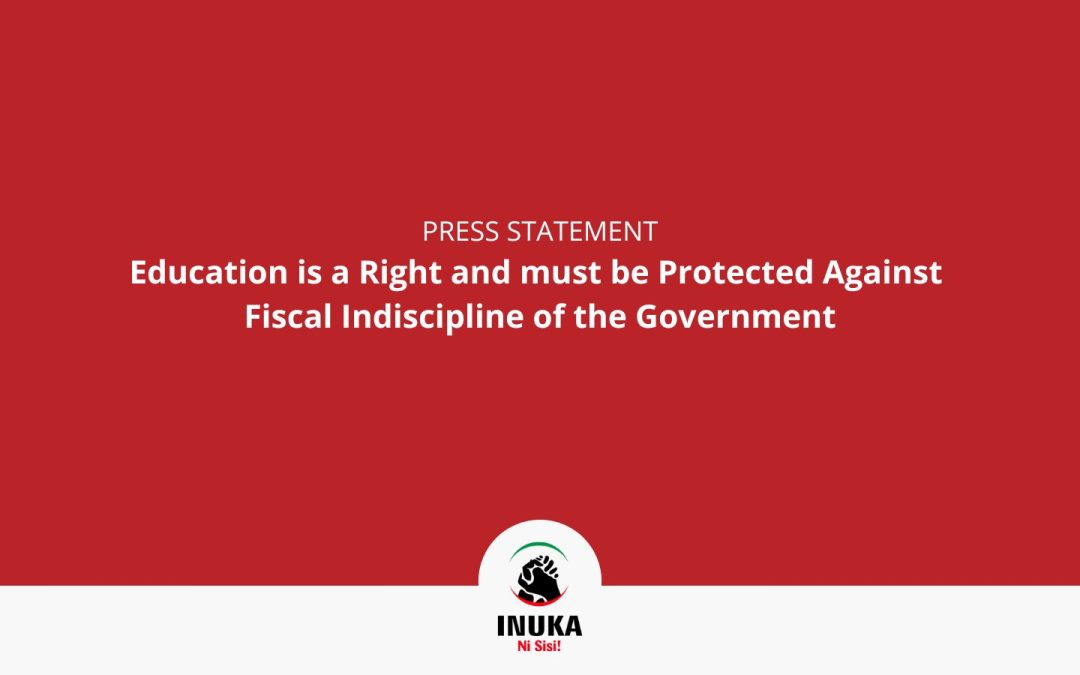
Education is a Right and must be Protected Against Fiscal Indiscipline of the Government
At Inuka Kenya Ni Sisi! we are alarmed by the growing public narrative being pushed by government officials that seeks to shift responsibility for the state of Kenya’s education system from the government to struggling parents. Recent statements by Treasury Cabinet Secretary John Mbadi that the country “is broke” and cannot sustain free education, as well as Baringo County Women Representative Jematiah Sergon’s remarks questioning the value of free education and bursaries, are not only misleading, they are dangerous.
The Constitution of Kenya is unequivocal. Article 43 (1) (f) says that every person has the right to education. Further, Article 53(1) (b) declares that every child has the right to free and compulsory basic education. This is not a token of generosity or a subject for political debate. It is a right and one that cannot be suspended simply because the government has failed to manage its finances prudently.
The attempt to rewrite the core principles of our Constitution and conveniently ignore the true problem: chronic underfunding, mismanagement, and a failure of accountability in public education. The government should stop deflecting blame. The education budget has seen deep cuts this financial year. Free Primary Education was reduced to KES 7 billion, Junior Secondary capped at KES 28.9 billion, and Free Day Secondary slashed to KES 51.9 billion. Capitation disbursements remain delayed, and arrears owed to schools exceed KES 64 billion. Instead of trimming lifelines, the state should be reforming procurement systems, recovering lost public funds, and prioritizing basic education in budget allocations.
Instead of criminalising learners and low-income parents, the national conversation must turn its focus to the real issues. The Auditor General’s recent report exposed a ghost school in Bomet County receiving fifty million shillings in capitation funds despite not existing at all. This shocking revelation confirms what communities have long known: that Kenya’s education crisis is not about affordability, but about transparency, integrity, and accountability.
It is unacceptable that while learners in public schools sit in crowded classes or under trees in some areas, share torn textbooks, and face teacher shortages, non-existent institutions are receiving public money with no consequences. Yet, rather than address these systemic failures, public officials are now implying that free education equals poor quality, or that parents have become irresponsible because bursaries exist. This is scapegoating not leadership.
Kenyan parents, especially those living in informal settlements and arid regions, understand the value of education. Many go without meals to ensure their children attend school. It is an insult to their sacrifice to suggest that state support diminishes their commitment. Quality education does not depend on whether it is free. It depends on whether it is properly resourced, equitably managed, and protected from theft.
We demand:
- A public apology from CS John Mbadi for his irresponsible utterances and Ms Jematiah Sergon for her remarks undermining the dignity of poor parents and the value of free education.
- Restoration and protection of the education budget to reflect the constitutional right to free and quality basic education.
- Institutional reforms within the Ministry of Education and Treasury to plug leakages and ensure future integrity in public education financing.
- Thorough investigations and prosecutions of all individuals involved in misappropriating education-related resources.
Signed,
Dr. Kawive, Wambua
Chief Executive Officer
Inuka Kenya Ni Sisi!
